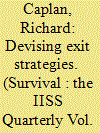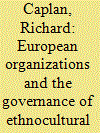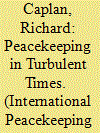| Srl | Item |
| 1 |
ID:
113162


|
|
|
|
|
| Publication |
2012.
|
| Summary/Abstract |
'Before we send our troops into a foreign country, we should know how and when we're going to get them out', US National Security Adviser Anthony Lake intoned in 1996, two years after the precipitate withdrawal of US forces from Somalia. Yet rarely has this requirement been met. Planning for exit as precisely as Lake's comments would suggest is difficult if not impossible, as the Clinton administration would discover in Bosnia and Herzegovina only months later. No one can foresee the circumstances that will obtain, and the course adjustments they may necessitate, once an operation has been launched. But this is not to say that more informed planning for exit is not possible. Not only has the subject of exit strategies received comparatively little sustained scholarly attention; it is also fair to say that policy in this area has been more ad hoc than carefully thought out.
|
|
|
|
|
|
|
|
|
|
|
|
|
|
|
|
| 2 |
ID:
133959


|
|
|
|
|
| Publication |
2014.
|
| Summary/Abstract |
The post-Cold War period to date has witnessed renewed international and especially European preoccupation with issues pertaining to ethnocultural diversity and the challenges for governance arising from these issues. This article discusses the shift that has occurred in support of national minority rights in Europe and why European organizations have become more concerned with these rights after the Cold War. It examines some of the major policy initiatives adopted by European organizations in response to the nearly 25-year long Yugoslav crisis and what these initiatives reveal about new (and old) thinking within these organizations with respect to national minority rights and the management of ethnocultural diversity more generally. It also discusses the consequences of these initiatives for minority rights protection and some of their broader implications for European policy in the future.
|
|
|
|
|
|
|
|
|
|
|
|
|
|
|
|
| 3 |
ID:
174096


|
|
|
| 4 |
ID:
078954


|
|
|
|
|
| Publication |
2007.
|
| Summary/Abstract |
Is neo-trusteeship an appropriate response to the challenge of 'precarious statehood'? To the extent that contemporary trusteeship-like arrangements have been at all successful, it is questionable how much utility they may have beyond the few cases to which they have been applied. There are alternatives to neo-trusteeship, some of which employ similar principles (notably 'shared sovereignty'), but, like neo-trusteeship, they require a consensus between local and international actors to succeed. Their limitations notwithstanding, what may most recommend arrangements of this kind in future is simply that they can represent the least worst option, if not sometimes the best hope, for easing a territory's transition from war, injustice and dependence to peace, basic human rights and relative independence in the context of the changing international order of the post-cold war era
|
|
|
|
|
|
|
|
|
|
|
|
|
|
|
|
| 5 |
ID:
052436


|
|
|
| 6 |
ID:
169235


|
|
|
| 7 |
ID:
153501


|
|
|
|
|
| Summary/Abstract |
This article is concerned with explaining why peace endures in countries that have experienced a civil armed conflict. We use a mixed methods approach by evaluating six case studies (Burundi, East Timor, El Salvador, Liberia, Nepal, Sierra Leone) and survival analysis that allows us to consider 205 peace episodes since 1990. We find that it is difficult to explain why peace endures using statistical analysis but there is some indication that conflict termination is important in post-conflict stabilisation: negotiated settlements are more likely to break down than military victories. We also consider the impact of UN peacekeeping operations on the duration of peace but find little evidence of their contribution. However, in situations where UN peacekeeping operations are deployed in support of negotiated settlements they do seem to contribute to peace stabilisation.
|
|
|
|
|
|
|
|
|
|
|
|
|
|
|
|